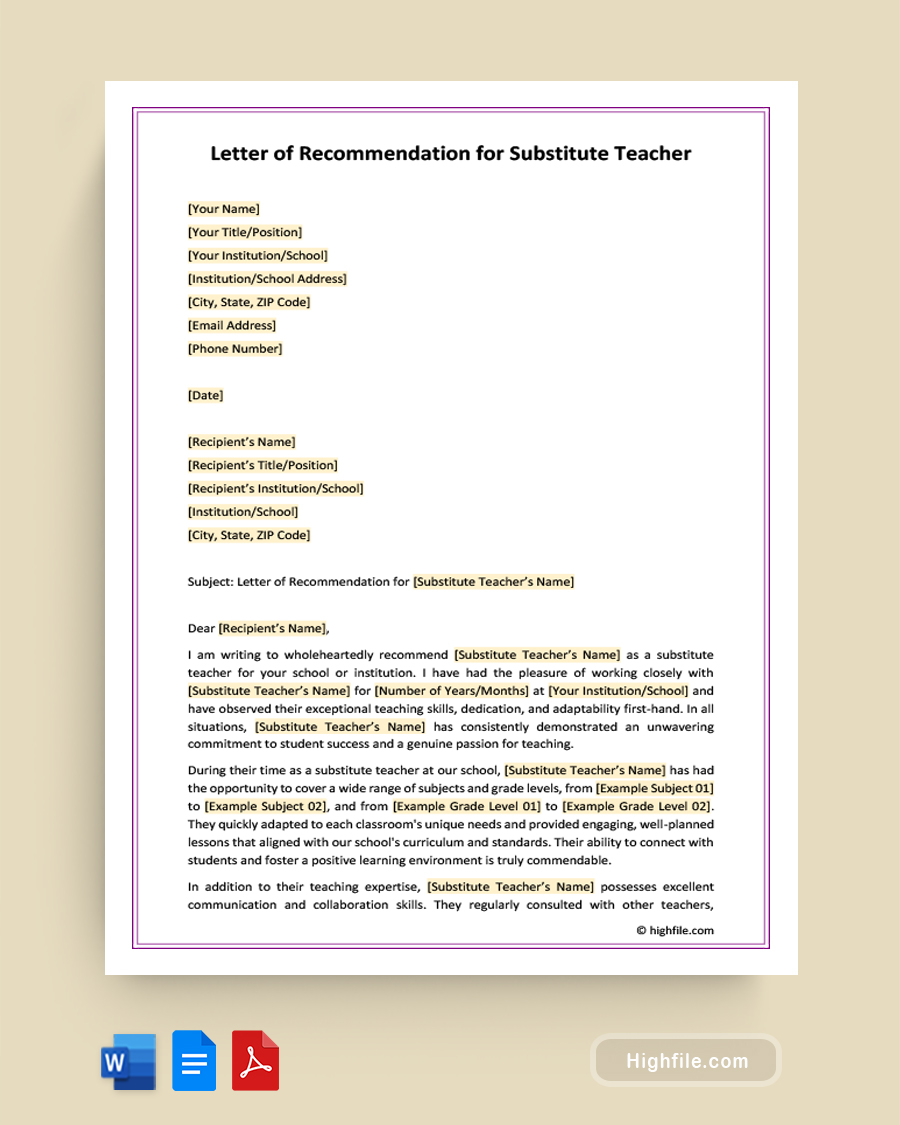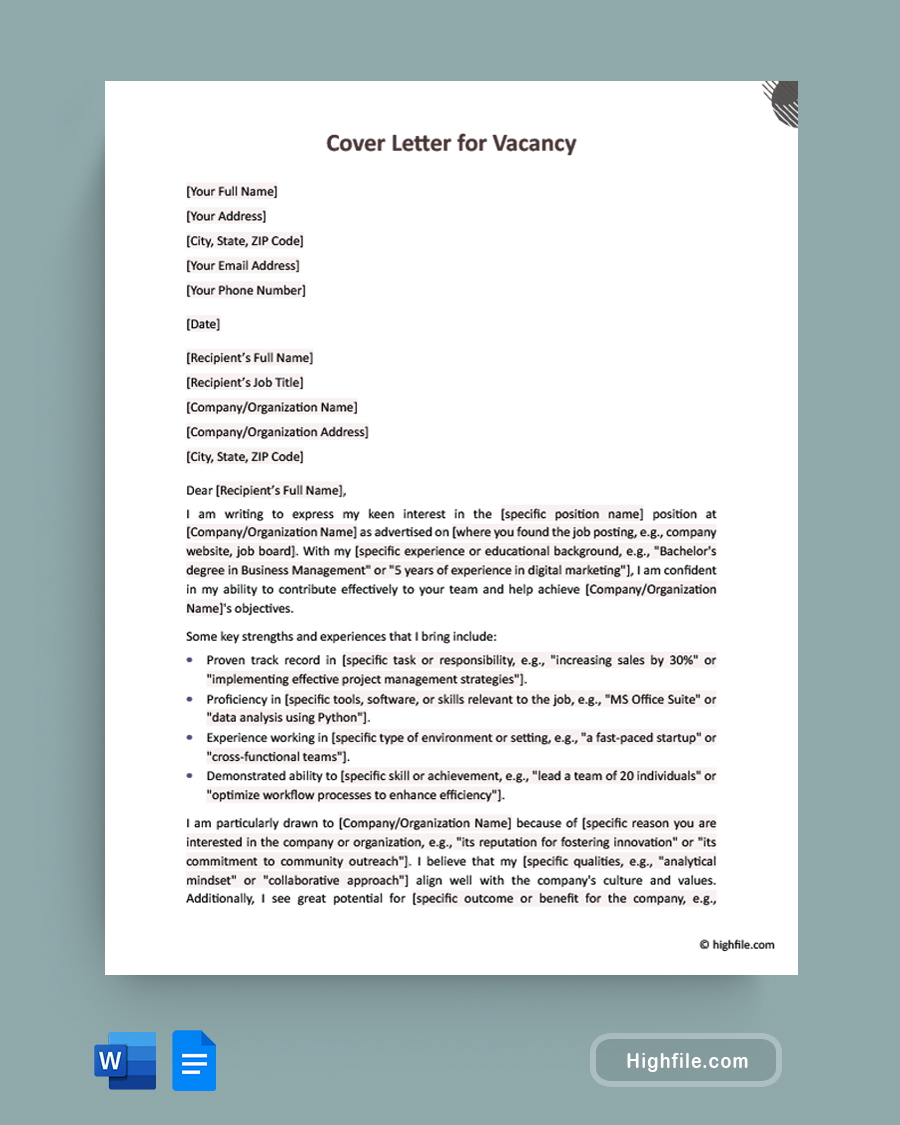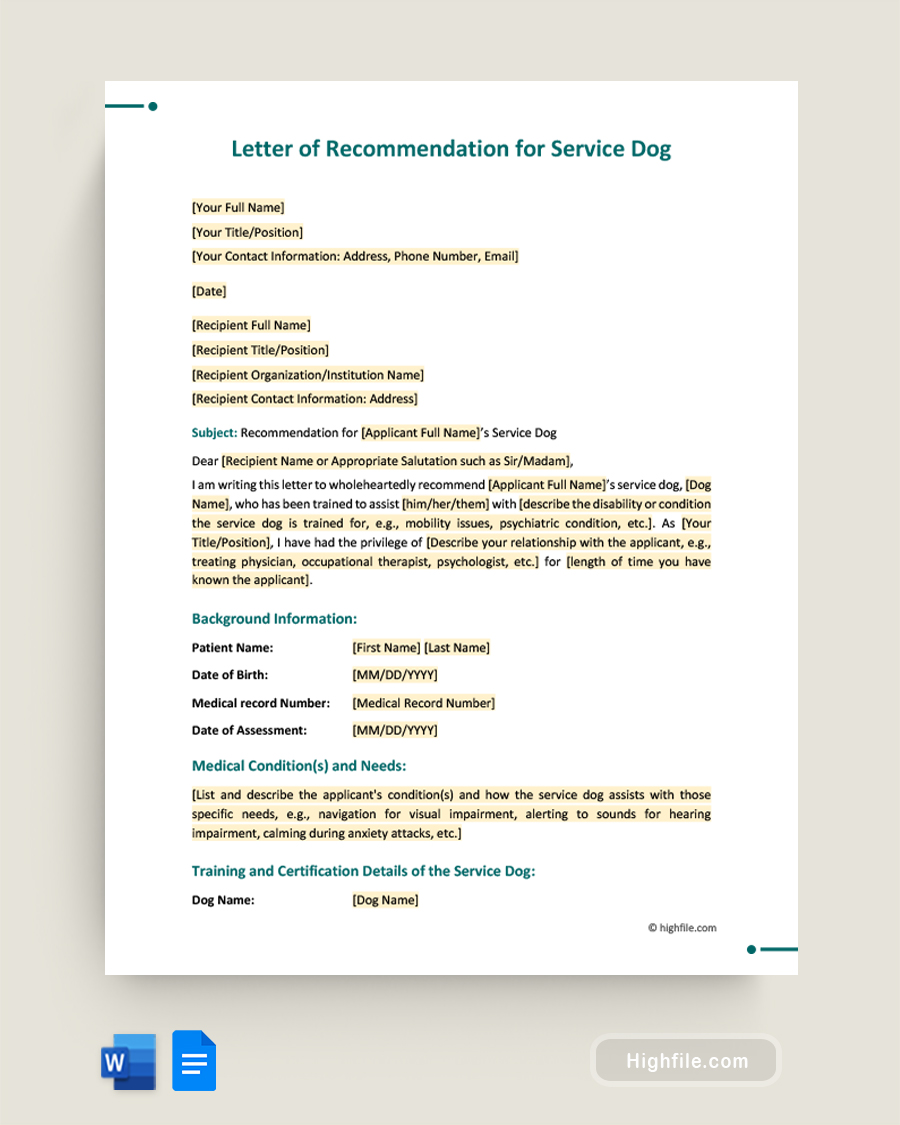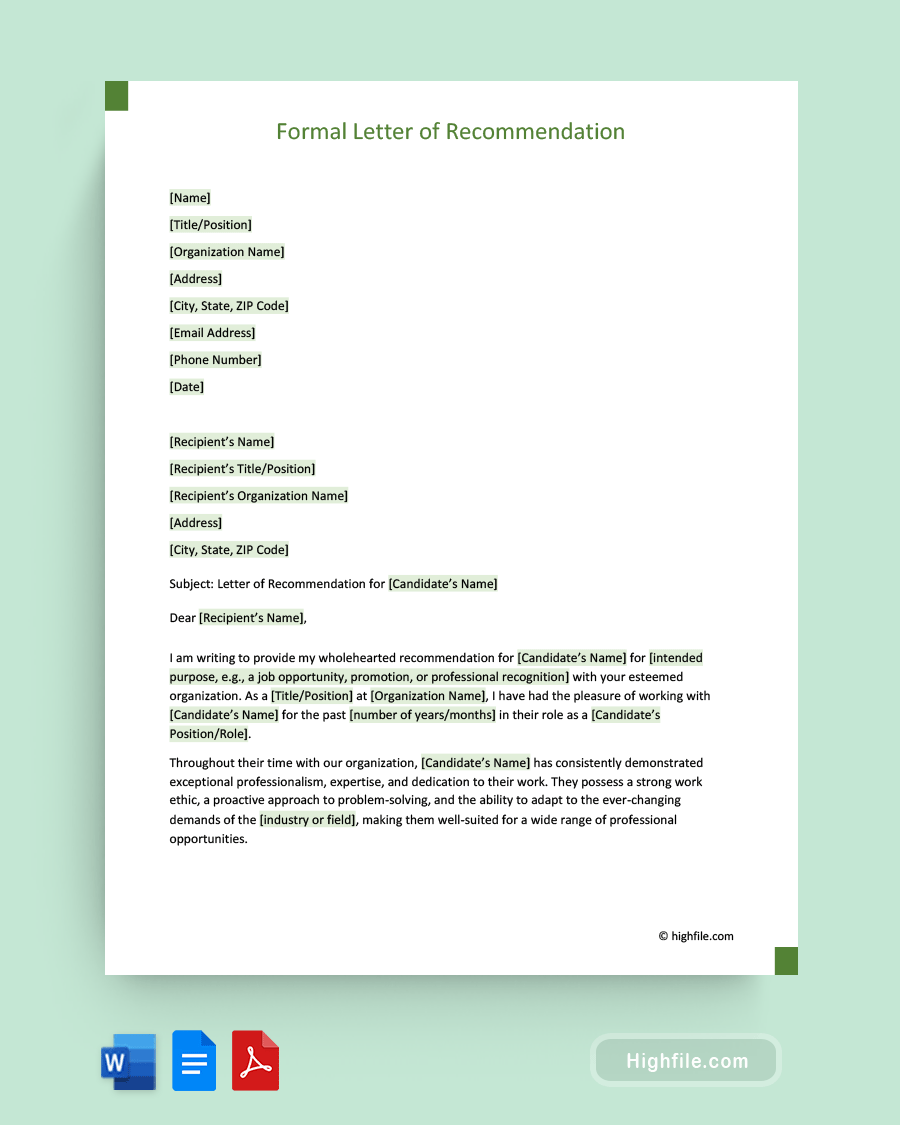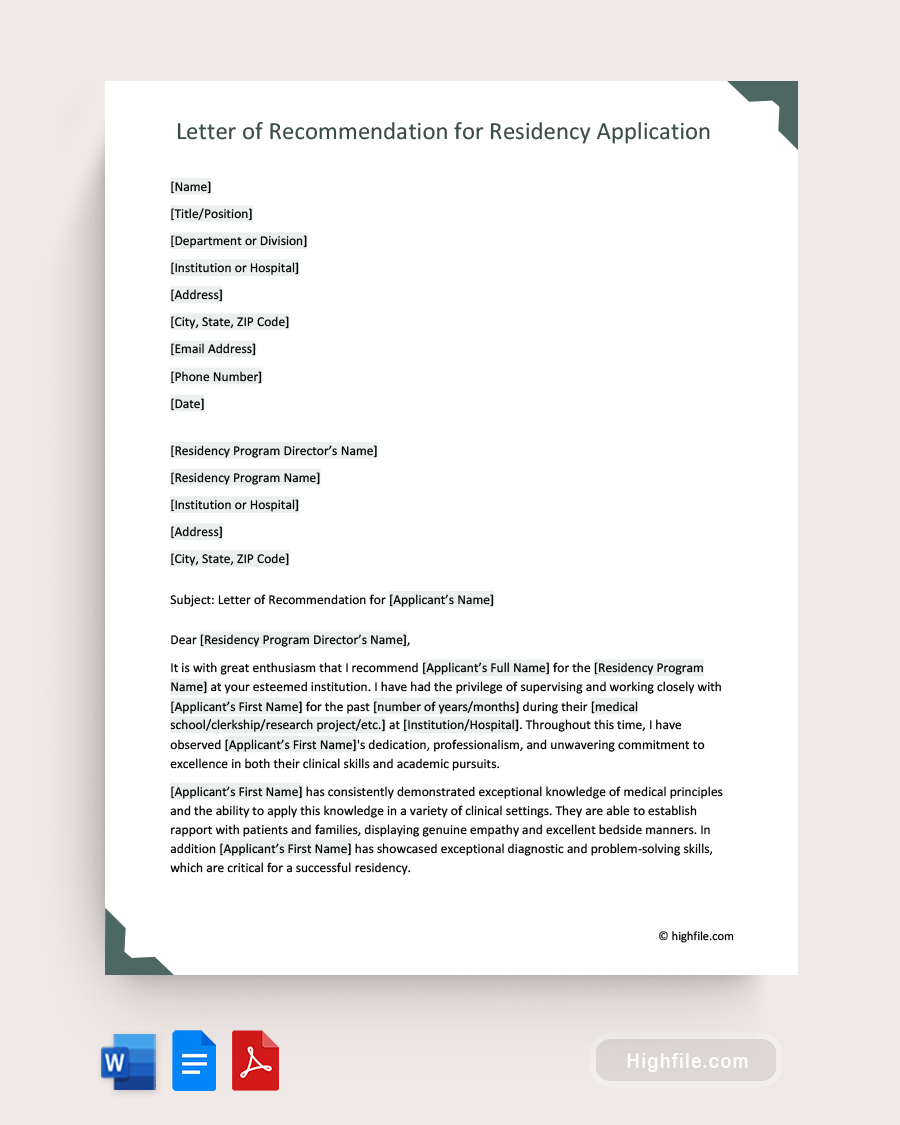A letter of recommendation for a substitute teacher benefits both the teacher and the recipient by providing valuable information about the teacher’s qualifications, skills, and abilities. For the teacher, a strong letter of recommendation can increase their chances of obtaining a new teaching opportunity. For the recipient, the letter provides crucial insight into the teacher’s work ethic, teaching style, and character, helping to make informed hiring decisions. Using a template can make writing a letter of recommendation more efficient and effective, ensuring that important details are included, and the letter is well-organized and professional.
What Is a Letter of Recommendation for a Substitute Teacher?
A letter of recommendation for a substitute teacher is a document written by someone who has had professional experience with the substitute teacher and can attest to their qualifications, skills, and abilities. The letter aims to provide a prospective employer with insight into the substitute teacher’s work ethic, teaching style, and character. The letter should include specific examples of the substitute teacher’s accomplishments, strengths, and challenges they have overcome in their teaching career. The recommendation letter should also highlight the substitute teacher’s professionalism, reliability, and flexibility in working with students and staff. A strong recommendation letter can significantly impact a substitute teacher’s chances of obtaining a new teaching opportunity.
Fun Fact: The practice of writing recommendation letters for this profession dates back to the 18th century when early substitute teachers were known as ushers.
Why Is a Letter of Recommendation for a Substitute Teacher Important?
Endorsement letters help people get jobs and other positions or continue their education. The more positive and memorable the endorsement, the higher the chance the candidate will stand out and be accepted. Here is why a letter of recommendation for a substitute teacher is important:
- It provides valuable insight into the substitute teacher’s qualifications, skills, and abilities.
- It helps the recipient make informed decisions about hiring by providing a third-party perspective on the candidate’s strengths and suitability for the position.
- It demonstrates the substitute teacher’s professional experience and accomplishments, enhancing their credibility and increasing their chances of being selected for a teaching opportunity.
- It can distinguish the substitute teacher from other candidates by highlighting their unique strengths and qualities.
- It offers evidence of the substitute teacher’s work ethic, teaching style, and character, which can be critical factors in the hiring process.
- It reassures the recipient that the substitute teacher is a reliable, competent, and experienced professional.
- It can help establish a positive reputation for the substitute teacher, making it easier to secure future teaching opportunities.
Important Note: For substitute teachers, classroom management and how they handle challenges, including challenges to their authority, is a critical skill. Give an example of how they efficiently deal with these types of disruptions in a kind, age-appropriate manner.
How to Write a Letter of Recommendation for a Substitute Teacher
When someone asks you to write a professional endorsement for them, it is a form of trust. They are showing faith in your writing skills and your ability to present them in a positive light for significant opportunities. Here’s how to write a letter of recommendation for a substitute teacher:
- Gather all relevant information about the substitute teacher, including their qualifications, teaching experience, and achievements.
- Begin the letter with an introduction that explains your relationship with the substitute teacher and your qualifications to write the letter.
- Use proper formatting that meets the recipient’s requirements, and consider using a template to ensure the letter is well-organized and professional.
- Include anecdotes and personal experiences demonstrating the substitute teacher’s classroom management, communication skills, teaching abilities, and personal qualities such as flexibility and adaptability.
- Discuss the substitute teacher’s classroom management skills, including their ability to manage student behavior, maintain order, and create a positive learning environment.
- Address the substitute teacher’s communication skills, including their ability to communicate effectively with students, colleagues, and parents.
- Highlight the substitute teacher’s teaching skills, including their ability to develop lesson plans, deliver instruction, and assess student learning.
- Emphasize the substitute teacher’s personal qualities, including soft skills.
- Provide a summary and endorsement that conveys your overall impression of the substitute teacher and your recommendation for them as a teaching candidate.
- Maintain a professional tone throughout the letter, avoiding overly personal or informal language.
- Edit the letter carefully, checking for spelling and grammar errors and ensuring the content is concise and relevant.
- Submit the letter in a timely manner to ensure that it is received before any application deadlines.
Pro Tip: Emphasizing a substitute teacher’s quick thinking and adaptability is vital. Compared to regular teachers, they don’t generally have the time to get to know the ins and outs of a single classroom, so being more versatile is essential.
FAQs
A typical letter of recommendation for a substitute teacher might range from one to two pages. Still, it’s essential to remember that quality is more important than quantity. A well-written letter with specific examples and details about the substitute teacher’s teaching experience and skills can be much more effective than a longer, generic letter lacking detail and specificity. Ultimately, the letter’s length should be appropriate to provide a thorough and compelling recommendation for the substitute teacher.
If a candidate has limited or no prior substitute teaching experience, it can be more challenging to provide a comprehensive letter of recommendation. In this case, the letter should focus on the candidate’s relevant skills, knowledge, and personal qualities that make them well-suited for substitute teaching. The recommender can highlight any relevant experience the candidate may have, such as previous work in education or experience working with children. The letter should also emphasize the candidate’s willingness to learn, adaptability, and strong work ethic.
As a general rule, it is not recommended to address potential areas of improvement for the candidate in a letter of recommendation. The letter aims to highlight the candidate’s strengths and qualifications for the position they seek. However, if there are specific areas where the candidate could improve, it may be appropriate to address them in a subtle and tactful manner. For example, instead of pointing out a specific weakness, you could focus on how the candidate has worked to improve in that area or how they have overcome challenges. This approach can show the candidate’s willingness to learn and grow while maintaining a positive tone.
Key Points
A letter of recommendation for a substitute teacher is mutually beneficial for both the teacher and the recipient as it offers valuable information regarding the teacher’s qualifications, skills, and competencies. For the teacher, a compelling letter of recommendation enhances their prospects of securing a new teaching opportunity. Meanwhile, for the recipient, the letter provides significant insight into the teacher’s work ethic, teaching methodology, and character, helping them make informed decisions about hiring. Employing a template can streamline the process of crafting a letter of recommendation, ensuring that pertinent details are included, and the letter is organized and professional.
